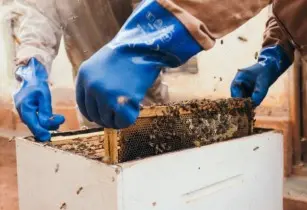The attorney general, minister of Agro-Industry and Food Security Maneesh Gobin launched a one-day workshop on the Apiculture Project titled ‘Alternative Livelihoods for Food and Income Security in the four Indian Ocean Island Nations’, at Voilà Hotel in Bagatelle
Apiculture is the maintenance of bee colonies, commonly in man-made hives, by humans.
The minister also remitted a one-off grant of US$462.68 to four local beekeepers for the purchase of beekeeping equipment under a scheme aiming at promoting apiculture. So far, out of the 33 beekeepers who applied for the grant, five who have already procured their beekeeping equipment have obtained their grant. The beneficiaries presented each remitted a sample of their honey production to the minister and foreign experts present.
In his address, Gobin reaffirmed the government's commitment to boost local production of honey and renewed his determination to provide local beekeepers with the necessary support. While underlining that in 2020, some 27 tons of honey were produced locally and some 300 tonnes were imported, the Minister stressed on the need to boost local production.
He informed there is a market for honey in Mauritius and encouraged local production and consumption of food. In addition, he cautioned that importation means losing the country’s foreign currency.
Speaking about boosting local production of honey in the country, he said the government is injecting direct investment through cash grants and concession on road tax, from which so far three registered beekeepers have benefited for their double cab vehicles. He also added that theMinistry of agro-industry is considering increasing bee zone areas and placing bee colonies in ‘chassés’, as well as setting up dedicated zones in naturally welcoming areas, including one new bee zone at Dauguet in Port-Louis.
He expressed gratitude to the two foreign experts from Kenya currently dispensing training in Mauritius, for sharing their knowledge and experience. On that score, he underpinned the importance to know the way things are getting done elsewhere in the region. He urged the participants of the workshop to make the most of knowledge of the experts.
The workshop
During the workshop, participants will be able to have an overview of the Apiculture Project in the four Indian Ocean island nations from foreign expert, Dr Elliud Muli, International Centre for Insect Physiology and Ecology, Nairobi, Kenya. They will also have the opportunity to familiarise themselves with the findings on the socio-economic evaluation of the apiculture project in Mauritius by Dr Gichungi Hannah Mumbi, from the International Centre for Insect Physiology and Ecology, Nairobi, Kenya.
The project
In 2019, the Ministry of Agro-Industry and Food Security signed an agreement with the International Centre for Insect Physiology and Ecology for a two-year phase II project entitled ‘Alternative Livelihoods for Food and Income Security in four Indian Ocean Island Nations (Mauritius, Seychelles, Comoros and Madagascar) and in Zanzibar (United Republic of Tanzania)-Phase II’ to boost up apiculture in Mauritius.
This project is a follow-up of the phase 1 project which was implemented from 2015 to 2017. The phase 2 of the project has been funded jointly by the Government of Mauritius and the International Fund for Agricultural Development. The main activities of the project have been the scaling up of technologies in improved beekeeping and pollination services and integration of forest conservation to consolidate gains in the first phase of the project; and establishing infrastructure and build and/or strengthen capacity to manage honey bee pests and honey quality control.




